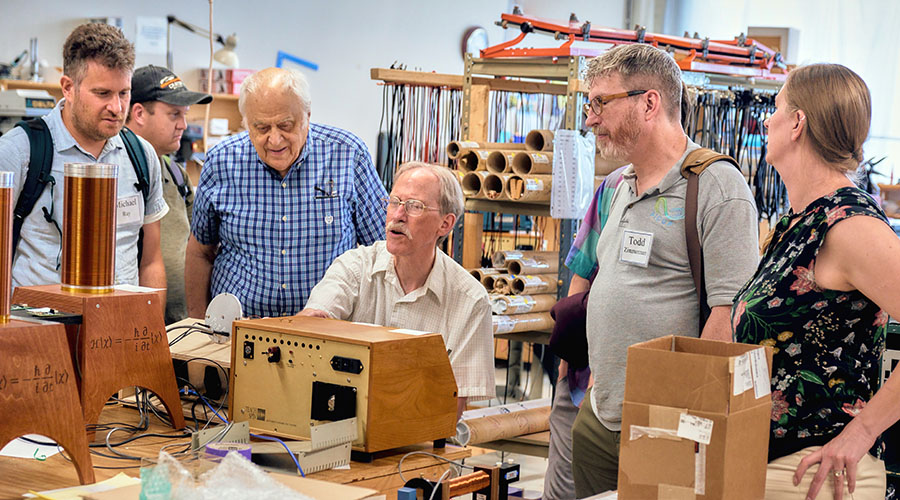
October 2023 (Volume 32, Number 10)
It’s Tough to Teach Computation in Advanced Physics Labs — So Physicists Workshopped It
In June, 12 faculty gathered at a Reichert Foundation workshop to brainstorm computation-based modules that instructors can incorporate into advanced labs.
By Liz Boatman | September 14, 2023

Credit: Matt Lohr
ICEP workshop participants explore a lab teaching tool, the TeachSpin innovation studio.
Hana Dobrovolny, physics chair at Texas Christian University (TCU) in Fort Worth, inherited her department’s advanced lab course in 2015. She knew she needed to introduce new labs that catered to biophysics and astronomy majors — easy enough. But incorporating computational work into the experiment-heavy course proved trickier.
“It’s going to be important for students to have good computational skills,” says Dobrovolny, and to understand the limitations of computers in physics careers. But while she was quick to identify more modern themes for the new labs, she still struggled to tie in computation.
Part of the problem is time. “The curriculum is, in part, a zero-sum game,” says David Van Baak, a former physics professor at Calvin College in Michigan, who frequently designed new setups for advanced labs. “There are only so many weeks in the semester, and anything you want to put in comes at the cost of needing to eject something else.”
Many advanced lab instructors are also isolated. In most physics departments, only one faculty member teaches advanced lab, making it difficult for instructors like Dobrovolny to work with colleagues to develop and implement innovative ideas.
Emeritus physics professor Jonathan Reichert, who founded the J.F. Reichert Foundation and co-founded TeachSpin, both dedicated to designing advanced physics labs for instruction, had been thinking for years about the challenge of integrating computation and experiment.
“[Reichert thought] maybe there was a natural overlap — a natural set of experiments and computations which could inform each other” to benefit advanced labs, says Van Baak, now TeachSpin’s lead physicist.
Reichert floated the idea of a workshop to the foundation’s board, and the idea stuck. The Integration of Computational and Experimental Physics (ICEP) workshop was held in Buffalo, New York, in June 2023, sponsored by Reichert’s foundation.
The goal of the workshop was to bring computational and experimental physics faculty together — experts from “both sides of the aisle,” says Van Baak — to re-envision the advanced lab experience for today’s students, who need to learn workforce-ready skills.
When Dobrovolny saw an advertisement for ICEP in her inbox, she jumped at the chance to apply. She and 11 other faculty attended, traveling from schools across the United States.
Van Baak kicked off the three-day event by having each attendee give a 10-minute presentation on a topic of their choice. “We got talks of very different character,” he says. “Some started from computation, some started from curriculum, some started from educational theory, some started from apparatus or software.” In turn, the presentations jumpstarted conversations and working groups about the upper-level physics experience.
One presenter laid out a three-circle Venn diagram — theory, computation, and experiment — and plotted standard courses, like optics and advanced lab, in it. The group was surprised to see that “there are very few things that naturally populate all three circles,” Van Baak says. “In other words, there are very few experiences students encounter that really show that there's this three-legged support for the enterprise of physics” — a challenge for Dobrovolny, an experimentalist turned theoretical physicist, as she redesigned TCU’s advanced lab course.
Dobrovolny says TCU’s upper-level physics courses used to look a lot like the traditional curriculum still followed at many schools. “In advanced physics courses, it’s often separated as ‘these are lecture classes where you learn the theory’ and then ‘these are advanced lab classes where you get to play with stuff.’”
“But that’s not really how it works when you get into research,” she says. “Even if you are primarily a theorist, you really do have to understand how the machines work, and what they're measuring, in order to model your system correctly. And vice versa — experimentalists need to understand the models so they can design experiments that can validate or disprove them.”
The workshop helped her realize that “the whole way physics education is done should be rethought,” she says. “We shouldn't have just lecture classes and just lab classes.”
She now has concrete ideas for new labs. And with support from other workshop participants, she plans to add computation to the existing nonlinear circuits lab in TCU’s advanced lab course. “It’s pretty easy to write down the equations for the circuit, and then you can have the students run those on the computer, and then hopefully they can get the real circuit to match,” she says.
Van Baak is excited to see how the ICEP participants will use ideas from the workshop, including “drop-in modules,” or fully developed short units combining computation with experimental work, which the participants conceived of as a way to support instructors like Dobrovolny.
Meanwhile, Dobrovolny hopes participants stay connected. “It was really nice to have other people with a similar mindset to bounce ideas off.”
Liz Boatman is a staff writer for APS News.
©1995 - 2024, AMERICAN PHYSICAL SOCIETY
APS encourages the redistribution of the materials included in this newspaper provided that attribution to the source is noted and the materials are not truncated or changed.
Editor: Taryn MacKinney
October 2023 (Volume 32, Number 10)
Articles in this Issue
